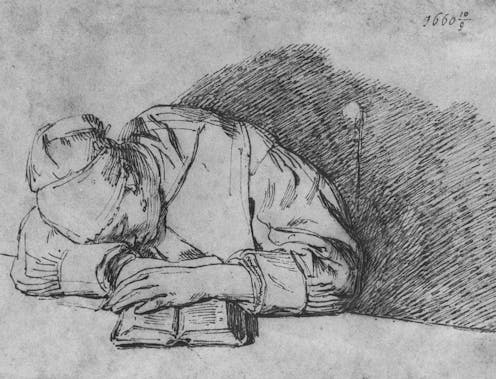Source: ForeignAffairs4
Source: The Conversation – UK – By Naomi Baker, Senior Lecturer in English Renaissance Literature, Manchester University

Women have been describing their experiences of male abuse for centuries – we just haven’t always been ready to listen to them.
In the 17th century, Anne Wentworth (1630-c.1693) spoke out against her abusive husband and the religious institution that protected him. She knew it was risky to reveal the shocking truth about an outwardly charming man who was regarded as a pillar of the community. Yet she felt compelled to tell her story.
Not only was her own life – and that of her daughter – on the line, but William Wentworth’s abusive behaviour was evidence of corruption within the Baptist church of which they were both members. Wentworth believed herself to be on a divinely appointed mission. God was using her as his “battleaxe”, she claimed, the instrument with which he would excise the rottenness at the heart of this religious community.
The remarkable Wentworth, who published accounts of her experience of spousal abuse, is one of a dozen dissenting 17th-century women whose incredible stories I tell in my book, Voices of Thunder: Radical Religious Women of the Seventeenth Century.
Like the other women in the book, Anne prioritised her sense of God’s voice speaking in her conscience above all else – a stance that empowered her to stand up to institutional forms of power and oppression. William and his powerful Baptist allies did everything they could to silence and to discredit her. But no amount of intimidation could divert her from her quest to bring the truth about her husband to light.
Originally from Lincolnshire, Anne married William, probably a glove dealer, in around 1652. They lived in London, where they were members of a “Particular” (or Calvinist) Baptist congregation. For almost 20 years, William “grossly abused” Anne both mentally and physically, being such a “scourge and lash” to her that she “lived in misery”.
By the time she was 40 years old, she was physically and emotionally spent. After so many years of suffering “great oppression and sorrow of heart”, Anne collapsed with a “hectic fever”. Narrowly escaping death, she believed that God had spared her life for a reason. No longer willing to live a lie, she decided that it was time not only to leave her husband but to declare her “testimony” to “the world”.
For years she had suffered in silence but now the truth poured out of her. In just four years she published four searing accounts of her experiences, including A True Account of Anne Wentworth’s Being Cruelly, Unjustly, and Unchristianly Dealt With by Some of Those People Called Anabaptists (1676) and A Vindication of Anne Wentworth (1677).
‘Mad’ women
Anne knew that publishing her story would enrage her husband and would alienate her from the church community that “could not bear the truth to be spoke” about him.
Her story was met with hostility, as she knew it would be. In the eyes of the Baptists, she wrote, she was a “proud, passionate, revengeful, discontented, and mad woman”, one who had “unduly published things to the prejudice and scandal of [her] husband” and had “wickedly left him”. She had given an account of decades of abuse, but it was Anne rather than William who was hauled before the leaders of their church, charged with “rejecting and neglecting their church” and with “dissatisfying” her husband.
Soon afterwards, Anne’s husband locked her out of her home. And then on September 25 1677 he committed what to Anne’s mind was his worst crime to date. Determined to suppress her testimony, William ran off with all her manuscripts, destroying six-years’ worth of writing. So “cruel” and “unchristian” had he become that by the following month Anne and her daughter were in hiding, having been forced to run for their lives. Her only so-called crime, she pointed out, was her writing: “Oh, injustice!”
It was Anne’s spiritual convictions that inspired her to speak out against oppression and injustice. She believed that God had spoken to her personally, calling her to fight not simply against her husband or the Baptist church but against wider forces of evil and oppression. Like many in her era, she believed herself to be living in the end times, when the battle against Antichrist spoken of in the biblical book of Revelation would reach its climax.
As a religious hypocrite, William in Anne’s view embodied the spirit of Antichrist, meaning that her crusade to expose the truth about him became to her mind nothing short of an apocalyptic struggle. It was this sense of the cosmic significance of her “testimony” that empowered her to tell her story.
Anne’s account of her experiences ends on a happy note. A year after being locked out of her home, she managed to regain entry, immediately changing the locks so that her husband no longer had the “power to come and put her out”. Supported by her remaining friends, she was back in the home where she had first put pen to paper, risking her reputation, home and community for the sake of speaking the truth.
Anne faced severe repercussions for telling the unvarnished truth about her life, but her determination to do so means that her story remains available to us today. It stands as testimony to one 17th-century woman’s refusal to be silenced.
Looking for something good? Cut through the noise with a carefully curated selection of the latest releases, live events and exhibitions, straight to your inbox every fortnight, on Fridays. Sign up here.
This article features references to books that have been included for editorial reasons, and may contain links to bookshop.org, so if you click on one of the links and go on to buy something, The Conversation UK may earn a commission.
![]()
Naomi Baker does not work for, consult, own shares in or receive funding from any company or organisation that would benefit from this article, and has disclosed no relevant affiliations beyond their academic appointment.
– ref. The 17th-century woman who wrote about surviving domestic abuse – https://theconversation.com/the-17th-century-woman-who-wrote-about-surviving-domestic-abuse-260128
